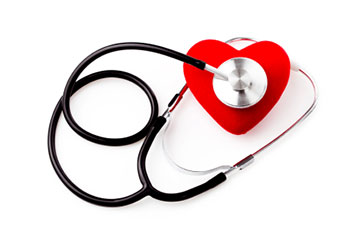
The heart is the hardest working part of your body. It is a smooth muscle that beats involuntarily in order to circulate your blood. The beating is controlled by an electric impulse that lets your heart know when to pump. The heart is just bigger than your fist, and can weigh anywhere from 7 to 15 ounces. The heart contracts and expands 100,000 times a day and pumps approximately 2000 gallons of blood a day. That is why it is so important to make sure that you take proper care of your heart.
Maintaining your heart’s health is very important because you can develop heart disease that does not just affect your heart but your body’s overall health as well. Heart disease is common and the best way to prevent it is to take good care of your heart and your entire body.
Common Forms of Heart Disease
There are many different forms of heart disease (also known as cardiovascular disease), the most common are Angina, Congestive heart failure, heart attack and arrhythmia.
Angina refers to chest pain that is caused by too little blood and oxygen circulating throughout the body. Congestive heart failure is caused by the heart not effectively pumping therefore allowing fluid to back up in the lungs. This is a very serious form of heart disease. A heart attack can also be very serious, and even fatal. It occurs when the blood supply is cut off from a portion of the heart. An arrhythmia refers to an abnormal heart beat.
Heart Disease Prevention
The best way to prevent these types of heart disease is to maintain good health. One’s lifestyle plays a huge factor in their heart’s health. In order to reduce one’s risk of developing heart disease follow these everyday suggestions. Manage your stress levels and monitor your blood pressure. If you feel your stress and blood pressure levels are unmanageable visit a doctor to see if there are treatment options available. Practice eating a well-balanced diet that is rich in fruits and vegetables and low in high saturated fats and carbohydrates. Monitoring triglyceride levels is a good way to monitor your heart health. Getting blood tests to make sure you triglyceride levels are within a healthy range is one of best indicators of heart health. Get at least thirty minutes of exercise per day and monitor your weight. If you are carrying additional weight, increase your activity level and diet in order to help combat your chances of developing heart disease Obesity is a major contributor to the development of heart disease. Screening your cholesterol and blood sugar levels to ensure that they are normal, if your numbers are high be sure to seek medical advice on how to how to lower them. Quitting smoking and alcohol intake can also reduce your chances. If you do notice any symptoms such as irregular heartbeat or pain in your chest do not hesitate to call your doctor or go to the local hospital. The earlier that heart problems are detected the sooner you can begin treatment so that long-term damage does not occur.
Treatment
Treatment for heart disease can range from lifestyle changes like quitting smoking, increasing your activity level and dietary changes. For more serious heart conditions medications may be necessary to help combat the disease. Treatment plans should be discussed with a health care professional in order to ensure it is the best plan for you. Surgery is usually the last resort when treating heart disease because it is very invasive and risky. Heart surgery ranges from angioplasty which is minimally invasive to heart transplants.